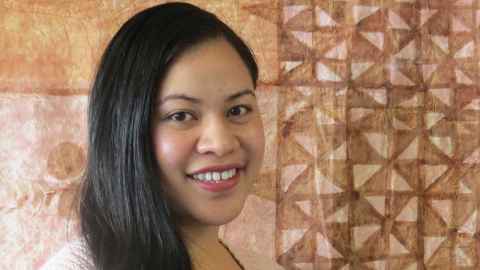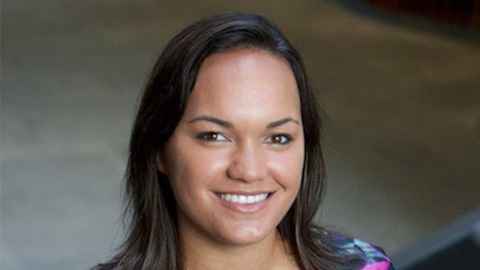Our Māori and Pacific Postgraduate students
Meet some of our students who have gone on to complete their postgraduate study and read about their experience.
Gemma Malungahu- PhD candidate in Health Sciences

“My PhD topic seeks to explore housing policy and the housing experiences of Pacific families, specifically looking at rheumatic fever as a case study among Pacific people in the Counties Manukau region.
“I am currently enrolled into the PhD programme and have graduated with my Master of Public Health (honours) at the University of Auckland.
"MAPAS Postgraduate support has helped me transition from overseas studies into the Master of Public Health programme.
"Opportunities to attend numerous writing wānanga and gain valuable advice and support from MAPAS Postgraduate staff have helped mould my experience during my postgraduate studies. I am now in my provisional year of the PhD programme and continue to value the ongoing support and aroha from the MAPAS team.
Jamie-Lee Rahiri - PhD candidate

Jamie-Lee Rahiri (Ngāti Porou, Ngāti Whātua ki Kaipara, Te Ātihaunui-a-Pāpārangi) is doing her PhD in the Department of Surgery (School of Medicine) and is doing her research on Bariatric Surgery in Māori - The Case for Equitable Outcomes.
Jamie-Lee has undertaken this research because there are few Māori or Pasifika surgeons in Aotearoa.
“Undertaking a PhD in Surgery is an extremely challenging journey but one that is vital in equipping myself with the knowledge and skills to support my ambition to monitor my own practice and the outcomes of my patients by ethnicity post-surgery to ensure equitable quality of care and outcomes.
“My thesis aims to prove that comparative to New Zealand Europeans, Māori have unfavourable outcomes following bariatric surgery such as lower estimated weight loss and higher weight regain.
“Using a mixed methods approach governed by Kaupapa Māori methodology, we aim to challenge current standardised bariatric follow-up regimens and support the need to incorporate kaupapa Māori interventions to better support Māori on the bariatric journey and truly enhance and optimise our health gains following this procedure."
Jaime-Lee believes that MAPAS PG provides a home away from home. A culturally safe and supportive environment upholding tikanga Māori including whakapapa, manaakitanga, aroha and whakawhanaungatanga.
“For myself, clinical research has been a contentious space and I've had to negotiate various spaces that are naturally quite antagonistic to Māori ways of knowing and being. As a Māori clinical researcher, I find that we consistently operate at the research interface between Māori and Western paradigms - this being significant at the nexus of Te Ao Māori and Surgery.”
“MAPAS allows you to find people who are also on the same journey and occupy a culturally comfortable space. At a simple level, it means you have people to bond with and essentially keep yourself sane! On a greater and more important level, you can create a network of like-minded individuals from whom you can draw strength when you are working in contested spaces.”
“As the whakatauki goes 'E hara taku toa i te toa takitahi engari, he toa takitini' - success is greatest when we band together."
Ariel Schwencke- Master of Health Sciences student

Ariel Schwencke (Ngāpuhi) is doing her MHSc in the School of Population Health and is doing her research on the associations between witnessing family violence, bullying and mental health outcomes among adolescents: results from Youth ’12, the National Health and Wellbeing Survey of New Zealand Secondary School Students.
Ariel has undertaken this research because further research is needed as to understand the relationships between family violence, bullying and mental health outcomes for adolescents in New Zealand.
"This study is significant because it will help provide sound evidence about potential factors and inform effective public health interventions.
"It aims to contribute to the field by examining the association between witnessing family violence, bullying and mental health outcomes among adolescents in New Zealand by utilising research obtained by Youth’12."
“MAPAS PG provided me with support in navigating the university system and understanding the best pathway for my studies. I am grateful for the academic support, but also for the pastoral support in times of need.
"MAPAS has become a second family in the sense that I have been able to make meaningful connections and ties with MAPAS advisors and students. This has made my postgraduate study at the University of Auckland much more meaningful and successful as I have been able to learn from others’ experiences and incorporate their advice into my studies.
"During my studies, I have been learning a lot about the term ‘resilience’ in relation to the youth population. Resilience is the ability to bounce back during times of stress and postgraduate study can be a stressful experience!
"However, I believe there are ways that an individual can be more resilient during postgraduate study by
- Identifying your weaknesses and building upon your strengths
- Choosing papers that you are interested in and can help you reach your goals
- Building relationships with your professors and lecturers
- Seeking help early
- Ongoing re-evaluation your academic writing and skills
"Your MAPAS advisor and MAPAS PG peers can help with this journey, so don't feel like you need to do this alone! Ask for support with these things at the start and begin to build your resilience as a postgraduate student."
Find out more
Reach your goal with the help and support of MAPAS PG Student Services.
Call one of the advisers and discuss your goals and ambitions and how we can assist you.